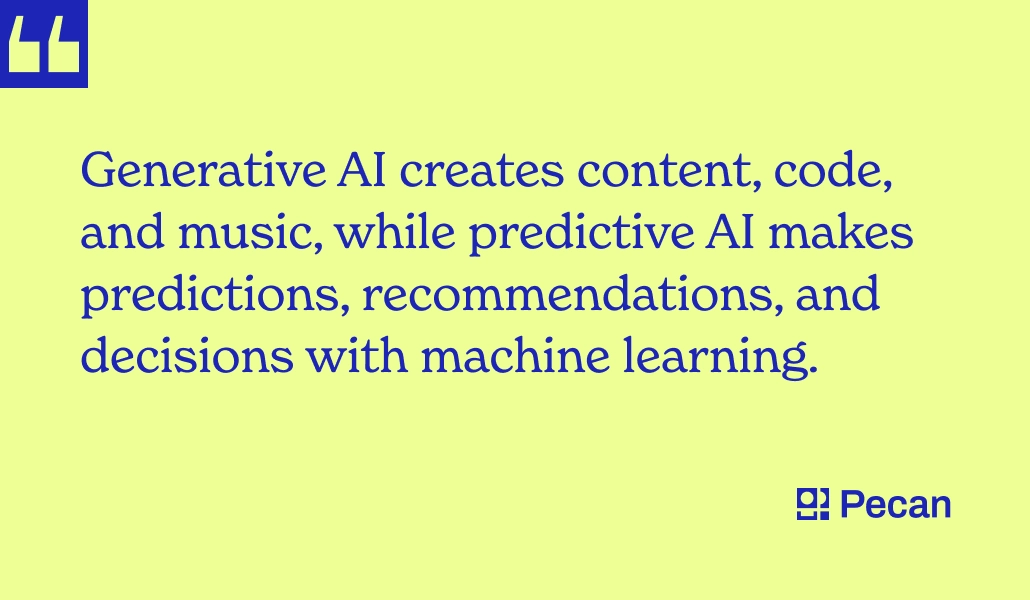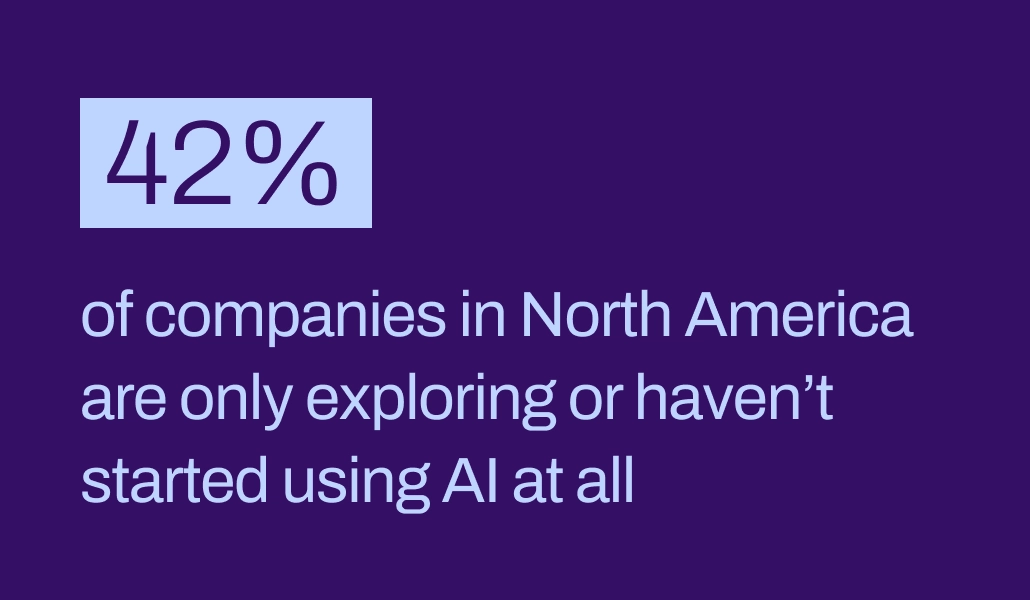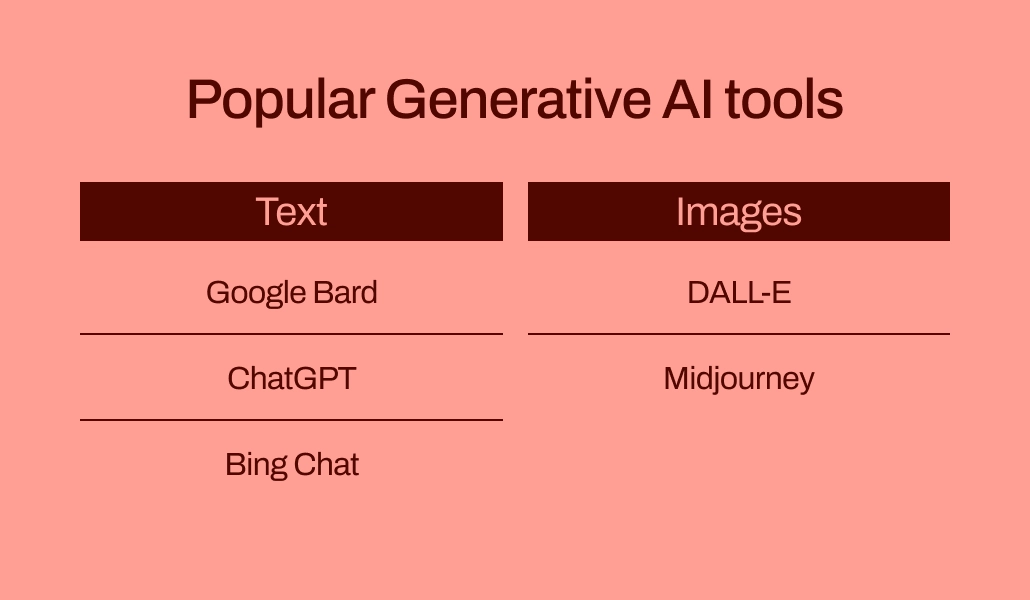In a nutshell:
- Generative AI, or GenAI, is a form of AI that uses algorithms to create new content and make predictions.
- AI has become crucial in the business world, revolutionizing industries and driving growth.
- GenAI can generate personalized content, improve customer engagement, and optimize business processes.
- Predictive AI can forecast future outcomes, helping businesses make informed decisions and strategic plans.
- Combining GenAI and predictive AI can enhance customer service and boost marketing efforts.
Ever wondered what happens when your average computer decides to put on its creative hat? Enter the world of Generative AI – where algorithms, typically known for their serious number-crunching day jobs, decide to dabble in creative side hustles and go by “GenAI” for short.
What is GenAI? GenAI is a type of artificial intelligence that uses neural networks to generate new, unique data, such as images, text, or other content, based on patterns and information learned from existing data.

In this guide, we will dive more deeply into the generative AI world and uncover its applications and benefits. As businesses strive to stay ahead in the digital age, understanding the basics of AI is crucial, since AI has the potential to revolutionize industries and drive growth.
Whether you’re a business leader or a data professional, we’re here to equip you with the knowledge you need to harness the power of GenAI and other AI forms in your business.
By understanding and utilizing this cutting-edge technology, you can unlock the potential of AI and successfully propel your business into the future. It’ll be more than a side hustle — you’ll see meaningful success.
Understanding the Role of AI in Business
As we journey further into the digital age, AI’s role in business continues to reach unprecedented heights. Let’s look at AI’s rise in the digital landscape and why it is so important in the business world today.
The Rise of AI in the Digital Age
AI’s prevalence in today’s digital world is massive. With the emergence of technology and the exponential rise in data, artificial intelligence technology has quickly transitioned from being a trendy tech term to a business staple. It has disrupted the corporate plateau and brought about an era of digital transformation.
Businesses are driven by data, and AI has proven instrumental in harnessing the wealth of information generated by the digital world. With its potential for pattern detection, predictive analysis, and automation, AI has become the cornerstone of many digital strategies, paving the way for more efficient and data-driven operations.
That doesn’t mean everyone’s on board yet, though. According to recent research, 42% of North American companies are only exploring AI or haven’t started using it at all. Now is the time for your organization to launch initiatives and experiment.

The Importance of AI in the Business Sphere
So, why is AI significant in the business world? AI has the power to simulate human intelligence and to automate repetitive tasks, which reduces workloads and allows for increased productivity and efficiency in the workplace.
AI can also provide valuable insights into customer behavior, which helps businesses personalize their services and target their marketing efforts more effectively. By analyzing data and identifying trends, AI can help businesses make more informed decisions, which can lead to improved performance overall.
As AI evolves and matures, it is predicted to grow more compatible with business operations. Understanding GenAI and other types of AI and how to leverage them, could mean the difference between remaining competitive and being left behind in the advancing digital landscape.
An In-Depth Look at GenAI
To fully comprehend and appreciate the power and potential of AI in business, you’ve got to truly understand how GenAI works and how it can be applied in the real world. Generative Artificial Intelligence, or GenAI for short, is a form of AI that not only consumes and learns patterns from vast amounts of data. It also uses that knowledge to create new content. GenAI can generate anything from images and music to text, making it an exceptionally versatile and creative form of AI.
How GenAI Works
GenAI systems learn by observing huge amounts of data in text, images, or sounds, and analyze the patterns within the data. They then use these patterns and models with trillions of parameters to generate new, original content that is relevant and context-specific.
To break it down, GenAI works in a two-step process:
- GenAI uses specific learning systems to understand and decode the patterns in the data it receives.
- Then, it uses this understanding to create new data that mirrors the structure and style of the original data, which provides unique and creative outputs.
Real-World Examples of GenAI
From music composition and image generation to sophisticated text generation, GenAI has enormous potential applications across a wide range of fields. In business, GenAI can generate personalized emails, advertisements, or even predictive text for customer service chatbots.
Deepfake technology is a process where GenAI creates hyper-realistic images and videos (though this is clearly a source of potential for misuse). GenAI is also utilized in creating virtual assistants that generate responses and interact with users in a human-like manner.
One often underexplored aspect of GenAI is its application in the field of content validation. This means that GenAI can be used to analyze large volumes of content, such as research papers, articles, or user-generated content like reviews, and identify their validity and relevance.

GenAI can also revolutionize customer service operations by generating context-aware, personalized responses to customer inquiries in real time. This can range from providing product information to troubleshooting issues, reducing employee workloads and significantly improving response times. This ability to create a more streamlined and efficient customer service process while maintaining a high level of personalization and relevance represents one of the compelling applications of GenAI in a business context.
By mastering the basics of GenAI and understanding its potential, businesses can harness its capabilities and open a new path for innovation and growth. Edge-cutting technologies like GenAI are not just trendy buzzwords — they represent the next frontier of digital transformation.
GenAI vs. Other Forms of AI
When exploring the nuances of AI, it’s crucial to differentiate GenAI from predictive AI and other forms of AI. Although they may fall under the same overarching umbrella of AI, they serve different functions and have unique applications in the business world.
While predictive AI focuses on predicting future events based on past data, GenAI creates new content based on the existing content it has been trained to interpret. Predictive AI is about forecasting, like predicting customer behavior based on past purchases. GenAI, on the other hand, takes it a step further, creating new, personalized content for each customer based on their unique data patterns.
The Advantages and Disadvantages of GenAI and Other Forms of AI
GenAI has tremendous benefits, including its ability to generate unique, personalized content. GenAI could be considered more flexible and creative when compared to predictive AI because it doesn’t just analyze data. Instead, it creates new content. However, it’s not great at analyzing tabular data, which is the cornerstone of many businesses’ data repositories.
A powerful aspect of GenAI is its integration within various business operations. Its ability to generate unique and personalized content can be leveraged to improve customer engagement and overall customer experience.
In digital marketing, for example, GenAI can be used for content creation, such as drafting engaging blog posts, creating targeted ad copies, or developing social media posts that resonate with specific audience segments.
In research and development, GenAI can assist in generating new ideas, creative solutions to problems, and product design, contributing to innovation and growth.
GenAI can be a powerful tool in various business operations, providing numerous opportunities for businesses to optimize their processes, improve customer engagement, and drive innovation.
One challenge of utilizing GenAI is its unpredictability. Since it generates content based on learned patterns, it can sometimes create outputs that are off the mark, don’t make sense, or are just incorrect.
▶️ Has generative AI provided the business ROI it promised? Pecan’s CEO and co-founder comments on the outlook for GenAI
Understanding Predictive AI
Predictive AI has revolutionized many industries with its ability to forecast future outcomes. This skill allows businesses to prepare proactively rather than reactively. These predictions can range from future sales volumes to customer behavior, which gives companies an edge in their decision-making processes.
Predictive AI works by examining historical training data, identifying patterns, and using these patterns to predict likely future outcomes. By providing tailored services, it can help streamline operations, develop innovative products, and enhance customer interactions.
A predictive AI system operates like a well-trained analyst. It uses various techniques, including data mining, statistics, modeling, machine learning, and artificial intelligence, to analyze current data and historical facts and make predictions about future events.
To put it simply, predictive AI takes in a certain input, processes it using complex machine learning algorithms, and generates predictions about future outcomes. These outcomes could range from the likelihood of a specific purchase, estimating an event’s success, or predicting market trends and customer behaviors.
👉 Check out The Data Analyst 2.0, our in-depth guide to this rapidly changing role
Harnessing the power of predictive AI involves the careful collection and analysis of data. Businesses then leverage the predictions generated by predictive AI to make informed decisions and strategic plans.
The effectiveness of predictive AI largely depends on the quality and depth of the data being analyzed. The more comprehensive and accurate the data, the better the predictions. Therefore, a strong data management strategy is crucial when implementing predictive AI in your business.
The Benefits of Predictive AI in Business
Predictive AI is incredibly useful in the business world. It helps businesses make informed, data-driven decisions, improves customer engagement by predicting customer behavior and preferences, and optimizes operations by predicting trends and patterns in data.
Companies across a variety of sectors use predictive AI. Retailers utilize AI technology to predict future sales, streamline supply chains, and manage inventory, while financial institutions use AI for credit scoring and fraud detection. In healthcare, predictive AI helps diagnose diseases and predict patient outcomes.
Bridging GenAI and Predictive AI
In the business sphere, merging GenAI and predictive AI can produce extraordinary results. Where GenAI meets predictive AI, you find a powerful combination of creativity and accuracy. GenAI can mimic human creation for personalized customer interaction, while predictive AI can accurately foresee future patterns and trends. Together, they’re a force to be reckoned with.
▶️ Learn how Pecan’s Predictive GenAI fuses GenAI and predictive AI to provide business-oriented predictions
Combined, GenAI and predictive AI can enhance customer service by creating custom email responses with engaging text and anticipating customer needs. Together, they can also boost marketing efforts by generating personalized ads and predicting consumer reactions.
A notable example of GenAI and Predictive AI working in tandem is e-commerce. Online retailers use GenAI and Predictive AI to offer consumers a unique and personalized shopping experience.
👉 Dive deeper into predictive analytics with our accessible guide, The What and Why of Predictive Analytics
The Future of AI in Business
As AI continues to evolve, the roles of GenAI and predictive AI will become increasingly more significant in the future of business. Their ability to predict trends, coupled with the power to create personalized content, will be an invaluable asset in our digital age of transformation.
To prepare for an AI-powered business future, businesses must remain adaptive and forward-thinking while embracing AI technologies. They must carve out a strategy that incorporates GenAI and predictive AI to help maintain competitiveness and drive growth in the industry.
It’s also clear that many forms of AI offer a wide range of technologies, each with strengths, weaknesses, and unique applications. Businesses should aim to understand these different aspects of AI to best leverage the technology and grow as AI improves and advances.
Why Should You Choose Pecan AI for Your AI Needs?
Understanding GenAI is critical as businesses navigate the digital landscape. As we’ve demonstrated, GenAI and predictive AI offer tremendous opportunities to propel your business forward.
With your knowledge of what GenAI is and how it can serve your business, it’s time to take the next steps.
Together with Pecan AI, you can embrace GenAI technologies today and prepare for a future where AI is the norm, not the exception. Get in touch today or try a free trial of our platform now to get started.



